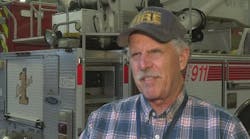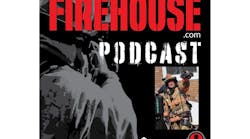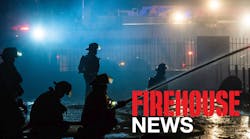Find full coverage of Firehouse World in San Diego this week on Firehouse.com and also on Twitter and Facebook.
SAN DIEGO – Social media means that everything firefighters and responders do and say, good or bad, can almost instantaneously become public record and widely disseminated. That’s why it’s important to not only manage your department’s image, but to control the behavior that reflects negatively on the department.
So says Candice McDonald, MA, who works with Cumberland Valley Volunteer Fireman’s Association, during a presentation titled “Reputation Management in an Era of Citizen Journalism,” at Firehouse World in San Diego.
McDonald, who is a volunteer firefighter with the Winona, Ohio, Fire Department, said to fire service leaders that bad behavior that’s spread through social media not only affects the department in which it happens, it affects the whole fire service.
“It brings us all shame when people screw up,” McDonald said, adding that humans do make mistake, but “you need to safeguard the fire department.”
Flashing headlines from all 50 states on a large screen, McDonald said no state is immune from bad news that is not only picked up on social media but by mainstream media as well.
“When Fireman Joe Shmoe is arrested for DUI, it damages all of us,” she said, reading headlines that implicated firefighters in all sorts of crimes including murder, arson, assault, substance abuse, child pornography and theft, to name a few.
“And it’s not just a volunteer problem, it’s not just a career problem it’s an everybody’s problem,” she said. “None of us are alone in this.”
McDonald said when people think of firefighters who abuse substances, including alcohol, they think “bad fireman.” However, it could be a coping mechanism for post traumatic stress disorder syndrome and the firefighter needs help, she said.
Firefighter arsonists is another problem, McDonald said, noting that young recruits hear veterans talk about the big fires and “war stories” and want a few of their own.
“They get bored and they start fires,” she said.
“So who is to blame,” McDonald asked the audience. “It’s not just a young person’s problem, it’s an everybody issue.” And with social media, there is no such thing as “sweeping it under the rug.”
“There’s a level of transparency today like never before,” she said. “The rug is transparent with social media and the problem just won’t go away by itself. …They not only see all of your issues, they see how you handle it and they’re watching us.”
That’s why McDonald said fire departments need policies and procedures in place to make sure when something bad happens, fire departments are prepared to respond.
McDonald said fire departments should have every member sign the National Firefighters’ Code of Ethics and renew them annually while explaining the importance of good conduct on and off duty.
“It’s also a CYA document for the media,” McDonald said, noting that if the fire department does have a firefighter that goes astray, the leadership can say each firefighter is expected to adhere to a code of ethics and the behavior is not condoned.
“Then you can hand the media the code of ethics with your statement,” she said.
McDonald said not every firefighter learns right from wrong from their parents or grandparents, but they can learn from fire department leadership.
“It’s not magic,” she said. “You can own a car but you need gas to get anywhere. You (fire service leaders) can be the gas to enforce the code of ethics.”
Cell phones and cameras on the scene are a hot topic today, especially with younger firefighters who are steeped in social media and can’t wait to post that they were at a fire and show photos, McDonald said.
Some departments ban cameras and cell phones on the scene and others require approval from an officer before any photos can be posted and still some offer a “stack of photos” on a computer drive that are approved for distribution, McDonald said.
“Things are being documented and reported immediately,” McDonald said. “You need social media policies to guide what you can and cannot share. We have to find a balance."
McDonald said young firefighters “live in a world of technology and they are dying to share the photos.”
“It’s like fire porn,” she quipped. “They love it. I love it.”
McDonald said older firefighters need to remember the pride, passion and enthusiasm they had for the fire service at one time and think about the younger firefighters who experience the same thing now with the ability to share it with family and friends.
“Let’s get the young guys out there doing the marketing,” McDonald said. “We have to find a balance. …Let them show what they are doing to their friends. She added the fire service is in a crisis for volunteers, noting what better way to recruit then by letting young firefighters show and tell all about the cool stuff they do.
She said if departments need to grant approval before the release of any photos for any kind of media, they need to do it quickly and have the images available as soon as possible giving the immediacy of social media and the desire some firefighters have to post photos.
McDonald said firefighters also need to realize that if they take photos with their phones, they could become evidence and confiscated by investigators with no guarantee of a timely return. That can sometimes be a deterrent for people taking inappropriate photos and posting them, she said.
Families also need to be included in policies regarding social media, McDonald said, noting that even family behavior can reflect negatively on the department.
“Have a conversation with your family because they’re not exempt from the conversation,” McDonald said, noting that spouses and family members are often asked about fires and emergencies by their friends looking for information.
McDonald also said fire departments need to react appropriately to negative social media when it gets posted. She said some department ignore the negative comments, or worse take them down which always causes more problems than solving.
“If it’s negative, leave it up unless it’s vulgar or violates HIPAA,” McDonald said adding that a positive response that addresses the person who posted the comments concern is a good idea too. “Bring the critic to the party. Sometimes, people just want to be heard. Don’t ignore the negative, it will just grow.”
McDonald said fire departments shouldn't avoid “tooting their own horn” either by posting positive items like fire prevention on social media sites.
“You are building relationships in the community,” McDonald said. “You need to say we made a mistake and we’re sorry.” That, along with the good stories helps create a positive image for the department.
McDonald said fire departments should also monitor social media and what is being said about their department and members. She mentioned several resources, like Google Alerts, Social Mention, Tweetbeep and
Talkwalker that alert users if keywords and their names appear on the networks.
McDonald also touched upon discrimination and harassment and how they can harm fire departments. She said negative images and propaganda about women shouldn’t be on the walls and dirty jokes shouldn’t be tolerated either.
“If you wouldn’t say it in a library or a school, it shouldn’t be said in the fire station,” McDonald said. “That will protect you from dealing with that kind of stuff.”
Theft in the fire service is also a huge problem, McDonald said.
“We trust one another with our lives,” McDonald said, noting that trust can harm departments when it comes to the theft of money and equipment. She said firefighters work hard for the money the raise and no one wants to face the public that gave it and say it was taken by a fellow firefighter. It also hurts when a member stiffs a fire department, she said.
“We assume everyone is honest,” McDonald said. “But, it’s important to have internal and external audits.” She also said background and reference checks for all firefighters is important, but those who handle money should also be subject to credit checks.
“If they can’t handle their own money, how can they handle the department money,” she said.
Having back up and assistant treasurers will not only ensure the money is protected, but it will create a succession plan for replacement if something unforeseen or unfortunate happens.
McDonald said fire departments need methods to handle bad behavior in the fire department. If something bad is happening in a firefighter’s life, they might be acting badly at the fire station or fire scenes, she said.
They might be abusing alcohol and McDonald said they need help and rehabilitation. She added it is not easy to recruit a volunteer and get them trained and equipped so it is worth the investment to “get them back on track.”
Human resources and the chaplain are a couple of resources that might work to help rehabilitate firefighters.
“We need to be checking on our members,” she said. “…We don’t want to lose people.”
McDonald said working with firefighters and having “kitchen table talks” is a good way to correct all kinds of behaviors and issues.
“It’s easier to have the conversation with the firefighter than it is with the media,” she said.
Full Coverage of Firehouse World:
- Photos: Hands-on Training
- Science Needs to Be Incorporated in Modern Firefighting
- Competent Command Essential at Incidents
- Innovative Apparatus on The Show Floor
- Firefighters Face New Challenges Daily
- Eisner Remember, Change Discussed at Firehouse World Opening
- Photos: Day 2 of Firehouse World
- Officers Reminded to Spend Time with Rookies
- A West Coast Versus East Coast Debate
- Photos: Day 3 of Firehouse World
- Fire Service Tradition Is Challenged by Progress
- Hash Oil Labs Create Danger






